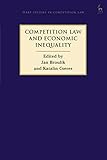Competition law and economics inequality / edited by Jan Broulík and Katalin Cseres.
Material type: TextSeries: Hart studies in competition law ; v. 29.Publisher: Oxford ; New York : Hart Publishing, 2022Copyright date: ©2022Description: xii, 365 pages : illustrations ; 24 cmContent type:
TextSeries: Hart studies in competition law ; v. 29.Publisher: Oxford ; New York : Hart Publishing, 2022Copyright date: ©2022Description: xii, 365 pages : illustrations ; 24 cmContent type: - text
- unmediated
- volume
- 9781509959273
- 1509959238
- 9781509959235
- 23 343.0721
| Item type | Current library | Call number | Materials specified | Status | Date due | Barcode | |
|---|---|---|---|---|---|---|---|
 Books
Books
|
MYCC Library General stacks | 343.0721 COM 2022 (Browse shelf(Opens below)) | Available | ||||
 Books
Books
|
MYCC Library General stacks | 343.0721 COM 2022 (Browse shelf(Opens below)) | Available | ||||
 Reference
Reference
|
MYCC Library Reference | 343.0721 COM 2022 REF (Browse shelf(Opens below)) | Not for loan |
Browsing MYCC Library shelves, Shelving location: General stacks Close shelf browser (Hides shelf browser)
| No cover image available No cover image available |

|

|

|

|

|

|
||
| 343.0721 COM 2002 The Competition Act, 2002, No. 12 of 2003. | 343.0721 COM 2019 Competition law for the digital economy / | 343.0721 COM 2022 Competition law and economics inequality / | 343.0721 COM 2022 Competition law and economics inequality / | 343.0721 COM 2022 Competition inspections in 21 jurisdictions : a practitioner's guide | 343.0721 DOU Douglas H. Ginsburg : an antitrust professor on the bench : Liber Amicorum / | 343.0721 DUC 2020 Natural monopolies in digital platform markets / |
Includes bibliographical references (pages 323-345) and index.
The gap between the rich and poor is widening across the globe. This book explores whether this major societal challenge of our time can be addressed by the means of competition law.The primary goal of today's competition law is to ensure that market power does not lead to an inefficient production of goods and services. Nevertheless, even such efficiency-oriented curbing of market power may arguably contribute to the reduction of differences in how much people own and earn. Furthermore, many competition law regimes do take into account distributive considerations too.The chapters investigate the relationship between competition law and economic (in)equality from philosophical, historical, and economic perspectives. Their inquiries concern the conceptual foundations of competition law and doctrinal frameworks of individual jurisdictions, as well as specific problems and markets. As such, the book provides a novel and comprehensive overview of whether and how competition law can contribute to more equality in both developed and developing countries.The book is a must-read for researchers, public officials, judges, and practitioners within the competition law community. It will also appeal to anyone more broadly interested in issues of inequality and economic policy.
There are no comments on this title.
